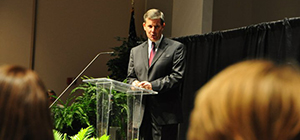By Jeff Brumley
For many pastors, two to three funerals a month is either average to a little high. For Barry Howard, that’s a light month.
Howard, senior minister at First Baptist Church in Pensacola, Fla., said he’s seen as many as a dozen funerals in a 30-day period.
Sometimes those numbers generate good-natured ribbing from other ministers and from fellow members of a national pastors’ group.
“They’ll ask ‘how many funerals this year?’” Howard said. “None of them have come close to doing that many funerals.”
“That many” has exceeded 850, Howard said.
 “It’s just an exorbitant amount,” he said.
“It’s just an exorbitant amount,” he said.
In those busier months — they have actually been slower since early 2013 — Howard was preaching more funerals than he was sermons and Bible studies.
“Everybody in this church is going to have my funerals completely memorized,” he said.
Funerals adding up
How and why Howard came to be something of a funerary pacesetter has to do with several factors, including the length of his career, the demographics in Pensacola and the generational makeup of First Baptist Church.
Unlike many modern pastors, Howard said he was one of those who started preaching when he was 16 and did his first funeral a year or two later — in 1979.
“In my first 26 years of ministry I preached 400-plus [funerals],” he said. “And I wish I had kept better records, but it’s well over 400 here.”
The funerals haven’t been limited to First Baptist or funeral homes in Pensacola. He’s also performed a number of military funerals locally.
Howard said he has travelled frequently to Alabama and Kentucky.
First Baptist itself gets a lot of the credit. The vast majority of the congregation’s 2,400 resident members are aging.
“The average age (of those being remembered) is extremely high — 93 to 94 — including several who are over 100.”
These are members who mostly joined the church between the late 1950s and mid-1970s, Howard said.
“It was a young generation that came here and grew old together,” he said. “Now that group of people who have grown old together is going on to be with the Lord,” he said.
Add to that the same causes of death that are common in most churches: breast cancer, surgery induced blood clots and vehicle and other tragedies.
Also, there are many funerals each year for people who never attended First Baptist. They may have been relatives of members or just acquaintances of Howard, other ministers and members.
“Some will say ‘I have a friend who has no church’” who has just died and needs a funeral.
“There are also some who were homebound who watched us on TV,” he said. One of the relatives will say “you were basically mom’s pastor — she has watched your program for seven years.”
Howard said it’s all added up.
“I did 11 funerals my first year as a pastor, and I said I bet I’ll never do that many again,” he said. “And I have done 70 in a year before — that was here.”
Before First Baptist, he added, “I never did more than 31 in a year.”
‘I will not do that’
Howard credits his upbringing in traditional Baptist churches for teaching him both how to conduct sermons — and how not to conduct them.
“I grew up in the country where funerals were 45 minutes with multiple preachers shouting hellfire and brimstone,” Howard said. “I said I will not do that.”
The services he leads typically last 30 minutes and, if there are multiple speakers, his eulogies will be around 12 minutes long. Otherwise they will last around 20 minutes.
Knowing what to say — especially when the service is for someone Howard never knew — can be one of the greatest challenges. So Howard said he uses outlines designed for specific kinds of death, such as suicides and tragic accidents.
He also has outlines for faithful Christians, for those who were not Christians and for those he never knew.
The forms prompt family members to answer questions. Answers are supplemented by interviews Howard said he conducts in person or on the phone.
The comments he gets from families of those unknown to him is that his comments felt genuine and sounded as if Howard actually knew the loved one.
In all cases, he said, it’s important to be as positive as possible.
“We want to send them off in a grand way and really celebrate life,” Howard said. “This isn’t mourning for two hours, and rather than grief talk it’s about the contributions of each individual.”
Declining numbers
Howard said he has conducted fewer funerals per month since 2013. He cited a number of factors for that.
One is that the wave of generational deaths has subsided. “Now we can expect a roller coaster beginning somewhere in the next six months to two years — another wave all in their 80s and 90s.”
Another is that his staff is beginning to perform more of the funerals. Before that, First Baptist was simply a church where its lead minister was primarily responsible for the funerals. Many other churches leave that duty to congregational care or pastoral ministers.
“There are pastors who just don’t do funerals anymore,” he said.
